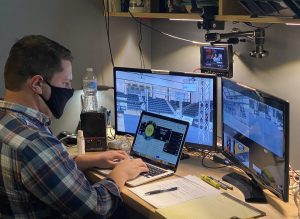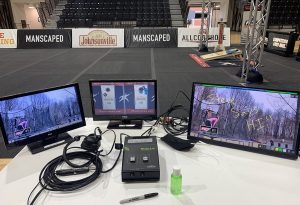ESPN, Tupelo Raycom Take Cornhole From Backyard to Mainstream With Live ACL Events
A hybrid-REMI workflow allows live ACL telecasts to be produced safely
Story Highlights
While the majority of mainstream sports remain out of commission due to the coronavirus pandemic, several fringe sports have stepped into the spotlight. Among the most notable has been backyard-classic cornhole, which became one of the few live sports telecasts to appear on television this month with a weekly series of American Cornhole League (ACL) Pro Invitational Qualifiers appearing on ESPN and ESPN2. The ACL’s longtime production partner Tupelo Raycom is handling these live productions, which feature strict safety regulations and plenty of innovative new workflows.
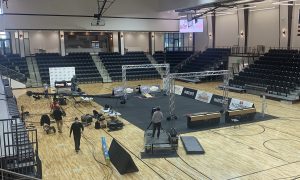
The first ACL Pro Invitational Qualifier since the pandemic hit was held at Rock Hill Sports & Event Center on May 9.
“We’ve been producing for the ACL for several years now and with many appearing on ESPN,” says John Servizzi, EVP, engineering and operations, Tupelo Raycom, “but this was something totally different. The ACL has done a really great job of creating virtual events to keep their membership and their fans engaged through all of this. It was our job to deliver that to viewers. We felt that it was an event we could get on-air safely and that, using technology, we could deliver a product that matched the quality of [coverage] we had delivered before in a traditional way.”
ACL Gets Back on the Board: From Virtual Events to Live on ESPN
When the pandemic shut down in-person ACL events, the league quickly pivoted to virtual and digital competition, with more than 60,000 ACL registered players having the option to compete via ACL Virtual and Facebook Live from their homes. The top qualifiers advanced to a series of ACL Pro Invitational Qualifiers in various cities throughout the country. All seven ACL events, which have replaced two canceled national competitions, are being televised on ESPN or ESPN2 (ESPN and the ACL signed a multi-year rights deal in summer 2017).
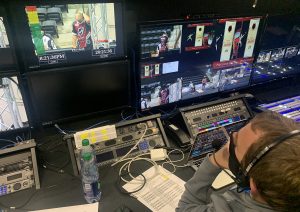
Tupelo Raycom Senior Producer David Harris was on hand inside the truck, but the rest of the crew were working remotely.
These ACL Pro events — the fourth of which will be held this Saturday in Las Vegas — are being held without crowds. Strict social distancing is in place for all participants, including doubling the distance between sets of boards during qualifying, modified rules requiring throwers to leave the box to maintain distancing, and gloved officials removing bags to reduce chances of cross-contamination. A nurse is also on hand to provide medical screening for players and personnel onsite.
“We want to make the events as safe as possible, even safer than going to the grocery store,” says ACL analyst Trey Ryder. “I think we accomplished that. I think everyone from both the production side and the players’ side have felt safe at the events. As weird as it is calling the game with my play-by-play guy 15 ft. away from me, it has really worked out and been a lot of fun.”
Servizzi adds, “The ACL has done a really good job as well on player safety and event management. They have been very buttoned-up and worked closely with CDC and local officials to ensure that everything is done at a very high level in terms of safety.”
REMI Workflow: Production Split Between Indy and Rock Hill
To produce these live broadcasts as safely as possible, Tupelo Raycom deploys a minimal crew onsite, with the majority of the production team located at its production facility in Indianapolis.
For the opening ACL Pro event May 9 in Rock Hill, SC, the onsite presence comprised Senior Producer David Harris (the only person in the production area of the truck), an engineer, a V1/A2 combo position, two on-air talent, a jib operator, and two camera operators. The rest of the team — director, replay operators, graphics operators, video shaders, and others — was located in separate rooms at Tupelo Raycom’s Indy facility.
The Rock Hill and the Indy crews were connected via the Unity software-based intercom system, which the Tupelo Raycom team had to learn on the fly in a few days before the May 9 ACL event. In addition, multiviewers from the truck were shared with the Indy production team via Microsoft Teams to allow executives to view the productions from their homes.
“We all were really excited to come into the office and do a show again, but we were all quarantined in our own little areas,” notes Tupelo Raycom Director, Remote and Studio Production, Andrea Crawford, who served as lead graphics operator. “The communication was really important because you can’t just look over and take off your headset to say something to someone. Instead, when our director would say something, we would hear it on comms and then interpret that and take our next steps. It definitely took some getting used to that timing and how we reacted, but we were able to get comfortable pretty quickly.”
Onsite in Rock Hill: Covering Cornhole at a Distance
Tupelo Raycom’s HD6 Champion production unit arrived in Rock Hill for setup on May 7, a full rehearsal with stand-in players on May 8, and back-to-back live shows on May 9 (on ESPN and ESPN 2, respectively). The skeleton crew onsite adhered to strict safety protocols, including face covering, regular sanitization of hands and workstations, and constant social distancing.
The production featured two hard cameras (instead of handhelds, to meet social-distancing purposes), one jib as the main “game camera,” one beauty shot, and two PTZ cameras mounted over the cornhole boards (a staple of ACL coverage).
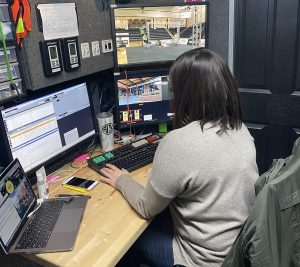
Tupelo Raycom Director, Remote and Studio Production, Andrea Crawford ran graphics for the ACL opener.
“From a storytelling perspective,” says Harris, “we tried a few different things that worked out really well. First, we wanted to [emphasize] how much focus was being put on safety protocols because ACL and ESPN wanted people at home to realize that what we were doing was safe. Second, it has been a long time since we used a gym for an event, so that opened things up coverage-wise, and we used the jib a lot to make the presentation more dynamic. Third, we did a couple of features about what players are doing at home and how they are using their home setups to stay sharp for the opportunity to come back and play. That provided a bit of a look at their personalities.”
In lieu of miking players — typically, a part of ACL broadcasts but not compatible with safety regulations — Tupelo Raycom subbed in a pair of shotgun mics at the base of the truss for the hard cameras. Although the production team wasn’t able to get the usual all-access audio of players’ strategy, an unforeseen new audio dynamic created a new level of excitement.
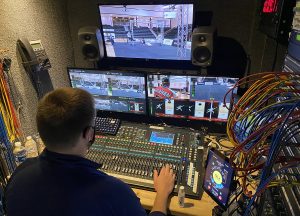
Audio for the ACL Pro Invitational productions is being mixed in Tupelo Raycom’s Indianapolis facility.
“Players could hear every single word that I was saying because it was such a quiet environment with no crowd,” Ryder recounts. “At first, I didn’t want to divulge too much, because I knew players would change their [strategy] based on what I was saying. My goal was to deliver the most analytical perspective possible to the audience, so I just put myself in a bubble and tried to deliver the same [level of analysis] that I normally do.”
Ryder also had a telestrator, which he operated from a tablet via a Team Viewer remote-desktop connected to an NDI-based system in Indianapolis.
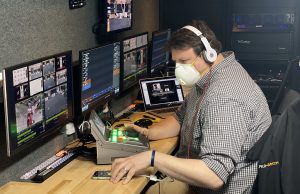
The at-home production crew at Tupelo Raycom’s Indy facility is all located in isolated rooms and wearing masks to ensure their safety.
On the transmission side, a TVU RPS (Remote Production System) transmitted the five main cameras to Indy and provided a program-return feed for talent onsite, and a LiveU 600 bonded-cellular system served as backup on cameras.
“Honestly, I think that the biggest and best surprise is just that everything worked, because this was truly our first time doing something like this for a network television broadcast,” says Servizzi. “The ACL and our crew did a sensational job under a very tough set of circumstances. We delivered the show we intended to, and we were just happy to be able to serve fans with some great content.”
